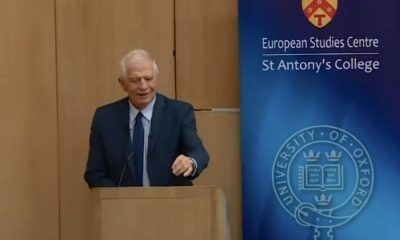עהעאַלטה
מער שיעור אויף # העאַלטהקאָרע זאָל ונדערסטאָרק דזשונקער ס ייביק זעאונג


Last week, European Commission President Jean-Claude Juncker gave his now annual ‘State of the Union’ address at the Parliament in Strasbourg, but observers in the field were surprised to hear little mention of healthcare, שרייבט European Alliance for Personalised Medicine executive director Denis Horgan.
In one small section Juncker did, however, state that it is unacceptable to still have children dying of measles in Romania or Italy. He added that these “avoidable deaths must not occur in Europe”, but on healthcare in general he was silent, with the word ‘patient’ failing to appear anywhere in the speech.
Let’s be honest, despite his often upbeat address to parliament, it has not been the best year for the EU chief, given that he has been at the helm of the bloc during the Brexit vote, the activation of Article 50 and subsequent negotiations (such that they are). Meanwhile, even his recent perceived love-in with British ex-prime minister Tony Blair raised eyebrows.
Despite the often questionable tactics of the UK Leave campaign, there is no doubt that Brexit has damaged Juncker and that the way citizens view the EU’s machinations was a direct contributor to the vote for leave.
Many of Europe’s rank-and-file have consistently sent out the message that there needs to be more transparency in Brussels, and many will tell you that the EU as a whole should take respon-sibility for major electoral (or other) knock-backs. Yet we’re not seeing or hearing much of that on the top floors of the Berlaymont.
Those so called ‘unelected men in grey suits’, those ‘faceless bureaucrats’, are still very often failing to get their messages across, although Juncker did at least acknowledge this to a degree with his com-ment about the need to “regain the hearts and minds of Europeans”.
Meanwhile, he admitted that the Commission has come under fire for its proposals to reform the Common Asylum System and strengthen rules on the posting of workers.
On the plus side, of course, Juncker will take considerable pleasure in the defeats of essentially anti-EU parties in France and the Netherlands, with a pro-EU leader guaranteed in Berlin regard-less of whether Angela Merkel keeps power or is defeated by the former President of the Europe-an Parliament Martin Schulz.
As his speech showed, Juncker is basically advocating more federalism now that one of the EU’s regular and most vociferous opponents, the UK, is waving goodbye in 2019. He seems keen to grasp the nettle and push for more integration in various key areas.
But not in health, it seems, and given that this area will affect every single EU citizen at one or ano-ther stage in their lives, this is a worry.
His comment about taking a “very critical look at all policy areas to make sure we are only acting where the EU adds value,” has had healthcare watchers wondering whether that means a Europe that will be less involved in trans-national health issues, rather than more involved, as many want.
Juncker revealed that First Vice-President Frans Timmermans will lead a task force, to include members of both the European Parliament and national parliaments, to take this ‘very critical look’. The task force should report in about a year’s time.
OK, healthcare is a Member State competence, but the EU has overseen many pieces of legisla-tion that have a direct impact on the health of its citizenry, including in the important realms of data protection, in-vitro diagnostics and clinical trials.
Many would like to see this continue as, in a Europe with an ageing population and co-morbidity issues, coupled with the huge financial pressure that this puts on healthcare systems, there is a strong argument for ‘more Europe’ rather than less.
Juncker certainly wants more Europe in certain key areas and was also keen to put an emphasis on the European trade agenda (with a possible dig at the UK when he said that the EU are not na-ïve free traders), climate change, consumer protection in the digital age (no mention of the benefits to health research by the sharing of data), and migration.
He pointed out that growth in the European Union has outstripped that of the US during the past two years, unemployment is at a nine-year low, with a record 235 million people at work, while the European Investment Plan has triggered €225 billion worth of investment so far.
Obviously, no-one would disagree that trade creates job and that jobs enhance livelihoods and lead to better standards of living, but it is also incumbent upon Brussels to ensure the quality of life of its citizens - and area in which health is paramount.
Juncker added that three principles must always anchor the union - freedom, equality and the rule of law. Well, there is certainly very little equality for patients across the EU when it comes to ac-cess to the best treatments that Europe can offer. Huge disparities exist very visibly and the com-mission president at the very least needs to mention it in such a speech, even if he feels there is only so much he and his team can directly do under the Treaties.
These days, citizens want more depth and substance to their lives. It should no longer be about working yourself to death just to keep yourself alive. A subsistence lifestyle should be a thing of the past, and citizens in this modern world should be able to develop themselves through the arenas of sport and culture, for example.
For that, and to help enhance trade in Europe, the EU’s citizens need to be as healthy as possible, because quite apart from the moral aspects of looking after people, health has been shown to mean wealth.
Juncker’s commission has, it must be said, worked hard to create a digital single market, which certainly has an impact on healthcare.
In this era of fast-moving science and the advent of personalised medicine, such a single market should greatly assist in putting Europe’s patients at the heart of these advances.
Several relatively recent reports by commission advisory groups have suggested exactly this, em-phasising areas such as patient access to electronic health records, so called telemedicine (includ-ing home monitoring), interoperability issues (which will certainly involve agreed standards in the arena of eHealth), and health inequalities when it comes to access. Juncker, however, neglected to mention any of this.
But he is aware that what we have come to call Big Data is here to stay. The majority of us are sharing more and more information in more and more different ways. The challenge now is how to use these data superhighways for the benefit of mankind.
In the EU, communications emphasise the European Commission’s aim of prioritising the Digital Single Market and encouraging co-operation between Member States on eHealth. The EU executi-ve has also promised to support countries in setting up cost-effective and interoperable systems.
Finally, Juncker also spoke about ‘value’ in his address. In healthcare, at least, an argument about what constitutes value has been ongoing for years.
With the European Parliamentary elections coming up in May 2019, those campaigning to become or remain MEPs should in part be helping to focus this argument while coming up with workable ideas that include this very important concept of ‘value’.
EAPM and its stakeholders believe that value should be seen from the patient perspective rather than simply looked at as a cash-based concept, thereby helping to revolutionise healthcare in Eu-rope.
Parliament can be key in this regard, but so can the commission. And the president of the EU’s executive should be acknowledging that fact at least somewhere in his often lengthy speeches.
שער דעם אַרטיקל:
-

 פּראָסט פרעמד און סעקוריטי פּאָליטיקקסנומקס טעג צוריק
פּראָסט פרעמד און סעקוריטי פּאָליטיקקסנומקס טעג צוריקאי.יו. פרעמד פּאָליטיק טשיף מאכט פּראָסט סיבה מיט וק צווישן גלאבאלע קאַנפראַנטיישאַן
-

 קירגיזיעקסנומקס טעג צוריק
קירגיזיעקסנומקס טעג צוריקדי פּראַל פון מאַסע רוסיש מיגראַטיאָן אויף עטניק טענסיאָנס אין קירגיזיע
-

 יראַןקסנומקס טעג צוריק
יראַןקסנומקס טעג צוריקפארוואס איז דער רוף פון די אי.יו. פּאַרליאַמענט צו רשימה די IRGC ווי אַ טעראָר אָרגאַניזאַציע נאָך נישט גערעדט?
-

 ברעקסיטקסנומקס טעג צוריק
ברעקסיטקסנומקס טעג צוריקא נייע בריק פאר יונגע אייראפעער אויף ביידע זייטן פונעם קאנאל
























